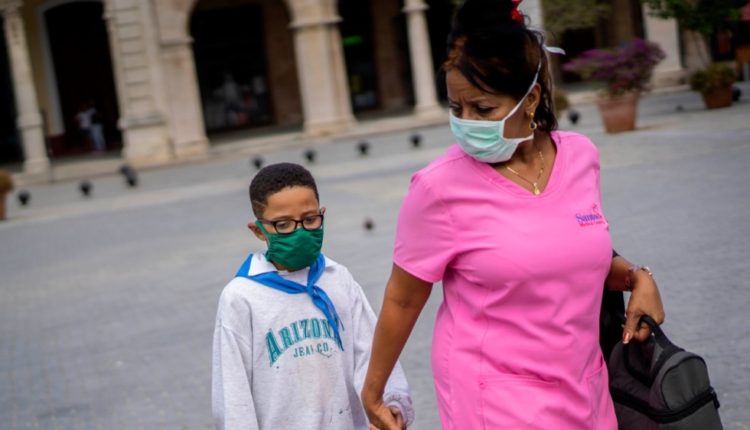
Cuba announces coronavirus measures
HAVANA – The suspension of all teaching activities for the next three weeks, as well as the prohibition of trips from province to province, were among the measures taken in Cuba and announced this past Monday to deal with the coronavirus situation. The announcement was made during a special appearance on the Mesa Redonda television and radio program by the ministers of Health, Education, Higher Education, Labor and Social Security, and Finance and Prices.
Cuba’s Prime Minister Manuel Marrero, during his presentation, cited a greater understanding in recent days of the risk involved, as well as the little perception of the risk involved by some sectors of the society. In the latter case, he singled out nightclubs and other leisure activities with large concentrations of people, who have been warned to avoid large groupings of people.
Measures taken on Monday (March 23) include:
Education
- Higher education centers will suspend all activities, but will continue in a non-classroom mode.
- When the primary, secondary and mid-level schools return, schedules will be restructured to avoid overcrowding in classrooms.
- National TV will be showing special educational programming.
- No parents will be allowed in pre-K centers.
Public health
- Prescriptions for prescribed drugs, and certain diets, will be extended for six months.
- Selective surgeries are suspended.
- Activity levels of health institutions have been reduced.
Local commerce
- Queues will adhere to a minimum distance of one meter between persons.
- An attempt will be made to distribute products with a high level of demand in an equitable manner.
- The sale of chicken will be expanded.
COVID-19 Prevention
- Classes are suspended until April 20.
- No person who does not reside in the country will be allowed in Cuba.
- Travel outside the country will be regulated for all.
- All trips by bus, trains and planes, as well as on private transport, are canceled.
Marrero explained that teaching activities would be resumed in four weeks, depending on the country’s epidemiological situation, which includes the spring break. In the next few days more details will be made available, he added, regarding facilities for working mothers and fathers and the operation of what are known as Infant Circles (a kind of pre-K) which will be kept open under special conditions and rigorous control.
He said that the president of the Institute of Hydraulic Resources will soon appear on television to explain measures taken dealing with the water supply in Havana.
It was reported that there are currently 42,873 Cubans on the Island who reside in other countries, 32,574 of them touristing in Cuba, who, since this past Tuesday, have been in isolation in their hotels and private homes until they can return to their homes. Under these circumstances car rentals for tourists have been suspended and rented vehicles should be returned gradually.
Tourists currently staying in private homes will gradually be moved to hotels managed by the Tourism Ministry. The cost of transportation will be assumed by the Cuban government, and the cost of accommodations will be similar to what they were paying in the homes where they were renting.
Marrero stressed that these are measures meant to “preserve the health and lives of the owners’ homes and everyone who lives in them,” and are not meant to prohibit tourism in private homes, nor do they respond to any economic interests.
The Prime Minister insisted on strict compliance with the new travel measures since they deal with people’s lives. Among the new regulations is the amount of luggage allowed to enter the country by returning Cuban residents. Beginning on Tuesday (March 24), passengers returning are only allowed one carry-on and one suitcase.
Excess baggage hinders airport operations in Cuba, he said, which already experiences inadequacies in the handling and delivery of baggage and packages at airports. The measure seeks to avoid large concentration of passengers for long periods of time at airport facilities.
“It is a humanitarian measure. We are receiving them with open arms, but cannot accept the large number of bags which, as part of the protocol, must be subjected to a process of disinfection and checking, which makes the process more complex,” he further explained.
Regarding the prohibition of inter-provincial travel, for both government and private transportation services, it was emphasized that government companies will refund 100 percent of the value of the ticket (be it buses, trains and national flights) to those who have been cancelled. Cases where travel is necessary for humanitarian and health reasons will be carefully evaluated.
Locally, measures for urban passenger transportation will also be analyzed. In these cases the responsibility falls mainly on persons who have not voluntarily secluded themselves and use public transportation unnecessarily under these new circumstances “and put the health of others at risk.”
Other measures imposed to avoid large groupings of people in shopping centers and institutions are the separation of at least one meter between persons in queues, and the temporary suspension of large fairs. Products arriving in the provinces will be distributed in shopping malls and through the gastronomy network. Also being looked at is the inclusion of some products in the ration card to ensure a more equitable distribution.
José Ángel Portal Miranda, Minister of Public Health, said that Cuba is considering the discharge of persons who have beaten the virus, because they have evolved favorably. He asked that older people not to go outside and stay in their homes.
As of Monday (March 23), there were 40 confirmed COVID-19 cases reported in Cuba, with one death. There are currently two persons in critical condition (hospitalized at the Pedro Kourí Tropical Medicine Institute), and one in serious condition (at the Fermín Valdés Military Hospital Domínguez).

